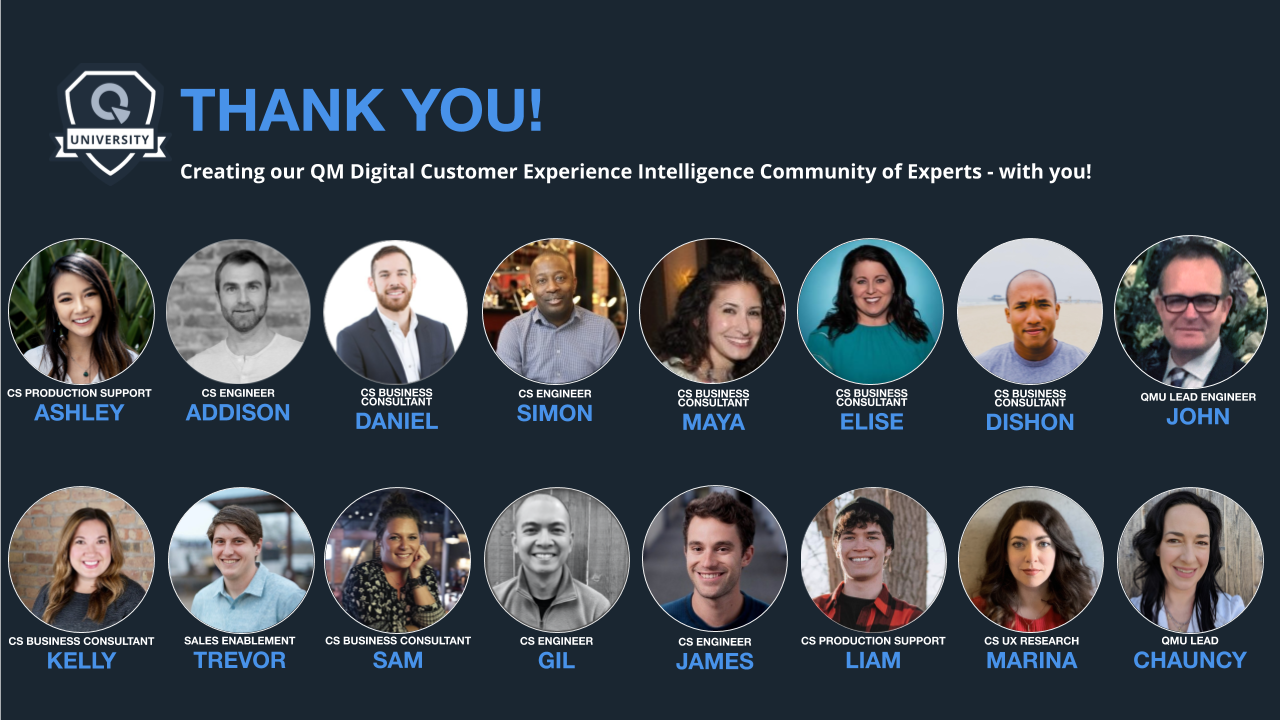Building a Community of Customer Experience Intelligence

Quantum Metric University – school is in session!
Why did we build Quantum Metric University? In short, this is my passion project. I came to Quantum Metric after 12 years at Dell and have a history in global IT Services work. Nine years ago, I transferred from IT Support field services onto the Digital Tools team, providing Analytics vendor support for all global teams: Marketing to UX Design to IT Support. My first project was, fortunately, our Tealeaf Proof of Concept. I was hooked.
We proved value immediately and saw a return on our sizable investment in six months as promised. It was a ton of work for our small dream team of three: me – the newbie, our rockstar hired ace admin, and a heavy helping of Tealeaf Customer Success consulting (who ended up joining us as an employee).
We had to scale to meet the demand of our cross-functional global teams. As we found optimization opportunities it became clear that many teams needed to understand the Customer experience intelligence data data to unlock results. In order to build a better experience, everyone needed to know what data we had, and how to use it.

We create content shaped continuously by data-driven insights.
We held weekly workshops in three major time zones, built FAQs, wikis, a SharePoint site, and presented at all the team meetings. We gathered pivotal feedback and analytics every step of the way. Using our program data, we were able to scale the right way to build for our customer success. Our Digital Customer Experience Management program grew to serve 1392 team members, 300 average daily active internal consumers, with sustained annual attributed returns reaching 1000x ROI, as well as the best customer satisfaction the company had seen in a decade. We hired no additional resources to do this and saved consulting hours for top tier engineering projects only. Instead, we built an operationalized program, in-house, with data that our teams needed to drive their programs’ success (and even created a Services offering to do this for our B2B customers)!
Who makes results happen? Your Teams become Customer Experience intelligence Ambassadors.
The critical component of our program’s success was empowering an extended team. We developed partnerships across the global organization with “Data Ambassadors”: 30 fellow employee subject matter experts from 18 different teams that saw the customer experience, and quickly learned how to use our data to make it better. We provided support and training for anyone that wanted it, how and when they needed it, by building out self-service content, live workshops, and community knowledge. In return, these ambassadors led our change control processes to define the data requirements as KPI measurements for every event and alert change request. These numbers could then be tied to sentiment and attribution, as well as marketing campaigns–data that illustrates customer retention, and brings your customers’ experiences to life.
You need to hit your goals. You need to understand this data, know what to do with it, in what order of priority, and how to make your actions show results we can all celebrate at the end of the journey.
Nine years of program analysis have shown what works to drive adoption and understanding across a global Enterprise. Cross-functional teams create sustainable bottom-line results year after year without the need for additional resources or a ton of consulting hours. Your entire company can become a part of your Community of Customer Experience Intelligence experts.
You can now use this model with Quantum Metric + QMU + your QM Team.
We’ve designed QMU to help you build tribal knowledge across your organization, uniting teams towards a plan for optimization. Our community will help you build a scalable, operationalized program focused on Digital Customer Experience Intelligence.
Let’s build your Best in Class program. Let’s build this community together.








